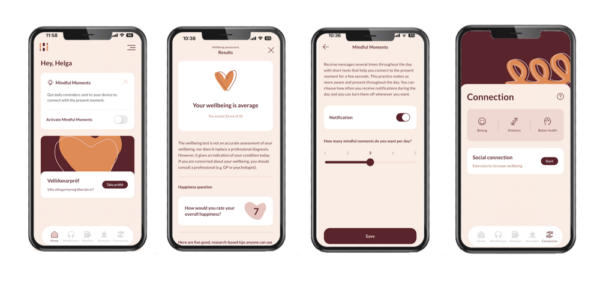To promote mental health by sharing experiences from the policy level to the clinical practitioner, incorporating evidence-based best practice and adapting initiatives to achieve long-term sustainability of mental health promotion and wellbeing at both personal and population levels.
Specific Objectives
SO1. To ensure effective dissemination of MENTOR activities/outcomes.
SO2. Promote sustainability and implementation of MENTOR outcomes across the different mental health care systems throughout the European region.
SO3. Strengthen mental health literacy capacity by developing policy recommendations and intervention tools targeting vulnerable groups and combating stigma.
SO4. Contribute to increasing access to evidence-based practices and innovative approaches to mental health surveillance, promotion and prevention to manage mental health conditions in communities.
SO4. Improve mental health surveillance systems to raise awareness of mental health problems, ensure earlier detection of those at risk, and address evidence-based decisions.
SO5. Improve mental health surveillance systems to raise awareness of mental health problems, ensure earlier detection of those at risk, and address evidence-based decisions.
SO6. Reduce social inequalities in the population served by people with mental health problems.
SO7. Promote methods to evaluate and implement MHIAP approaches at national and regional levels.
Project structure.
Summary Work Packages
- WP1: Project Management and Coordination (Cross-cutting)
Coordinates the efficient implementation of the project, ensuring quality and compliance on time and on budget. It includes the elaboration of the Project Manual, the administrative and financial management, the collaboration between WPs, and the creation of synergies with other actions in mental health.
- WP2: Dissemination (Cross-cutting)
Promotes effective internal and external communication to ensure that the objectives and results of the project are known and scalable. It manages channels such as web, social media and publications, optimising visibility and fostering cooperation between partners and stakeholders.
- WP3: Evaluation (Transversal)
Monitors project quality and stakeholder satisfaction, assesses the relevance of results to the needs of target groups, and measures the impact of the project in Europe in key areas such as sustainability, social inclusion and innovative digital solutions.
- WP4: Sustainability (Cross-cutting)
Supports the implementation and scaling up of pilots beyond the project. It promotes equity, diversity and sustainability through capacity building and the development of a methodological plan to ensure continuity of mental health interventions.
- WP5: Building Integrated and Comprehensive Mental Health Actions (Technical)
Develops a multilateral and preventive approach to mental health promotion, focusing on vulnerable populations. It boosts the inclusion of people with lived experience (PLE) and promotes the fight against stigma, aligning with EU initiatives.
- WP6: Innovative Digital Solutions to Improve Mental Health in Europe (Technical)
Develops evidence-based digital tools to promote mental health and facilitate the detection and treatment of problems. It focuses on improving access and affordability of interventions for vulnerable populations, such as migrants and refugees.
This Joint Action aims to have an impact on mental health policy and practice in Europe. It will promote the involvement of people with mental health expertise in the design of policies and services, testing different organisational forms.
It will also promote a ‘Mental Health in All Policies’ (MHIAP) approach, facilitating cross-country learning and developing applicable methodologies.
MENTOR will leverage digital technology to promote mental health prevention and assessment tools, and encourage the adoption of ‘Personal Budgeting’ in community care.
Its impact will span the short, medium and long term, improving accessibility, reducing inequalities and promoting innovative practices across Europe.
Under development. There is no full-time researcher in Osakidetza, but the feasibility of including the system in the most profitable way possible is being studied. Information will be updated as progress is made.
Biosistemak is the Competent Authority that coordinates the following 8 affiliated entities:
- (GENCAT) Subdirección General de Adicciones, VIH, ETS y Hepatitis Víricas. Generalitat de Catalunya
- (FRCB-IDIBAPS) Fundació de Recerca Clínic Barcelona-Institut d’Investigacions Biomèdiques August Pi i Sunyer and Hospital Clínic de Barcelona (HCB)
- (ICO) Institut Català d’Oncologia (Catalan Institute of Oncology)
- (IDIVAL) Marqués de Valdecilla Research Institute Foundation
- (FFIS) Fundación para la Formación e Investigación Sanitarias de la Región de Murcia (Foundation for Health Training and Research of the Region of Murcia)
- (SMS) Servicio Murciano de Salud (Health Service of Murcia)
- (SAS) Servicio Andaluz de Salud (Andalusian Health Service)
- (FundeSalud) Foundation for the Training and Research of Health Professionals of Extremadura
(SES) Servicio Extremeño de Salud (Extremadura Health Service), is an associate member, it is not included in the affiliated entities.
- Juan De la Torre, Dolores Verdoy, Ane Fullaondo.


